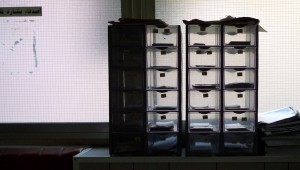Halfway down one of the flights of steps which links the streets winding up Achrafieh hill, left along to an open courtyard, is the mukhtar. This local official is an intermediary who can do wonders to speed up formalities one might normally complete by oneself – for a fee. This time we are here to pick up proof of my nascent nationality which we have been told is waiting for us.
Through the wrought iron bars of the open window we glimpse various forms in armchairs: the family. Feeling intrusive, we knock. The door opens immediately and a tiny woman steps forward in a dressing gown and tracksuit bottoms with a double stripe down the side. Red painted toenails jut out of her platform sandals, curving over the front edge of the soles. She has caramel coloured hair and pale eyes. A thin cigarette dangles from her unusually large hands, clutched between long yellowed fingers. As she answers our questions, a young girl joins her wearing pyjamas with Hello Kitty stretched across her belly.
It is decided that the mukhtar’s wife can do nothing for us; we must come back the next day. When we do, her officious but slow husband tells us the chances of the citizenship papers coming through are slim. No baby no citizenship, he tells us, patting his round belly for illustrative purposes. This is what he told us when I first visited Lebanon 18 months before, but it is not the official line. Since then I have jumped through every paper hoop put before me by the Lebanese Embassy in Paris, including obtaining a handwritten letter in Arabic from my husband stating that he has, in his benevolence, agreed to confer nationality on me. To cap it all, we called in the in-laws who pursued the issue at the Foreign Affairs Ministry in Beirut and got them to validate our request. The mukhtar discounts this authority with a brusque wave of the hand but, with a shrug, finally agrees to order a family identity paper and tells us that if my name appears on the right, I have obtained citizenship. If, on the other hand, it appears on the left, there’s no chance unless I produce offspring.
Three days later when we return as instructed to collect, monsieur le Mukhtar pretends not to recognise us, makes us wait while he moves forms and files around his desk and neatens his paperclip stash. Above his head the walls are papered with photos of him on special occasions with his wispy hair gelled firmly to his scalp, posing in a suit and shades or shaking hands with more prominent officials, including President Sleimane, who towers a head taller than his subordinate.
He insists we’ve come too early but then finally produces the document we requested. The name is on the right.

Georgia! this is so funny. I could almost see the fly stained walls. Glad that you won’t have to be forced to produce offspring for official purposes.